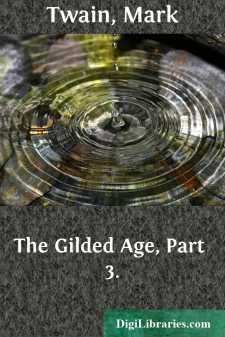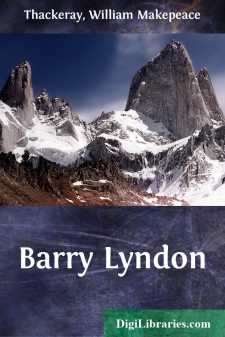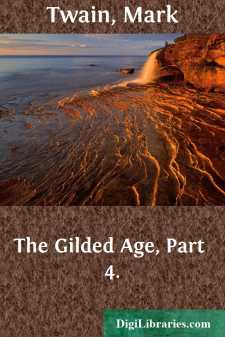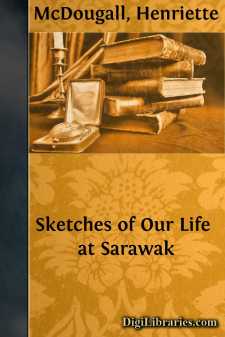Categories
- Antiques & Collectibles 13
- Architecture 36
- Art 48
- Bibles 22
- Biography & Autobiography 813
- Body, Mind & Spirit 142
- Business & Economics 28
- Children's Books 16
- Children's Fiction 13
- Computers 4
- Cooking 94
- Crafts & Hobbies 4
- Drama 346
- Education 46
- Family & Relationships 57
- Fiction 11829
- Games 19
- Gardening 17
- Health & Fitness 34
- History 1377
- House & Home 1
- Humor 147
- Juvenile Fiction 1873
- Juvenile Nonfiction 202
- Language Arts & Disciplines 88
- Law 16
- Literary Collections 686
- Literary Criticism 179
- Mathematics 13
- Medical 41
- Music 40
- Nature 179
- Non-Classifiable 1768
- Performing Arts 7
- Periodicals 1453
- Philosophy 64
- Photography 2
- Poetry 896
- Political Science 203
- Psychology 42
- Reference 154
- Religion 513
- Science 126
- Self-Help 84
- Social Science 81
- Sports & Recreation 34
- Study Aids 3
- Technology & Engineering 59
- Transportation 23
- Travel 463
- True Crime 29
Sort by:
by:
Mark Twain
CHAPTER XIX. Mr. Harry Brierly drew his pay as an engineer while he was living at the City Hotel in Hawkeye. Mr. Thompson had been kind enough to say that it didn't make any difference whether he was with the corps or not; and although Harry protested to the Colonel daily and to Washington Hawkins that he must go back at once to the line and superintend the lay-out with reference to his contract,...
more...
by:
Stephen Leacock
CHAPTER ONE: A Little Dinner with Mr. Lucullus Fyshe The Mausoleum Club stands on the quietest corner of the best residential street in the City. It is a Grecian building of white stone. About it are great elm trees with birds—the most expensive kind of birds—singing in the branches. The street in the softer hours of the morning has an almost reverential quiet. Great motors move drowsily along it,...
more...
A BIBLIOGRAPHICAL NOTE Barry Lyndon—far from the best known, but by some critics acclaimed as the finest, of Thackeray's works—appeared originally as a serial a few years before VANITY FAIR was written; yet it was not published in book form, and then not by itself, until after the publication of VANITY FAIR, PENDENNIS, ESMOND and THE NEWCOMES had placed its author in the forefront of the...
more...
by:
Mark Twain
CHAPTER XLVI. Philip left the capitol and walked up Pennsylvania Avenue in company with Senator Dilworthy. It was a bright spring morning, the air was soft and inspiring; in the deepening wayside green, the pink flush of the blossoming peach trees, the soft suffusion on the heights of Arlington, and the breath of the warm south wind was apparent, the annual miracle of the resurrection of the earth. The...
more...
by:
Mark Twain
CHAPTER XXVIII. Whatever may have been the language of Harry's letter to the Colonel, the information it conveyed was condensed or expanded, one or the other, from the following episode of his visit to New York: He called, with official importance in his mien, at No.— Wall street, where a great gilt sign betokened the presence of the head-quarters of the "Columbus River Slack-Water...
more...
Part I. Sir Francis Starts It It began to happen a long time ago, centuries ago, when, in a fragrant rush of rain, spring came one day to Punagwandah, fairest of the Channel Islands. Beneath the golden mists of sunrise danced a radiant sea. On steeply sloping hillsides where thickets of wild lilac bloomed, the lark shook from his tiny throat a tumult of glad music. In shadowed niches of the canyons...
more...
PREFACE. Those friends who have taken an interest in my literary productions may feel some surprise at my appearance in the character of a translator of Sanscrit poetry. To those, and indeed to all who may take up the present volume, I owe some explanation of my pretensions as a faithful interpreter of my original text. Those pretensions are very humble; and I can unfeignedly say, that if the field had...
more...
INTRODUCTION A mid the many celebrations last Christmas Eve, in various places by different persons, there was one, in New York City, not like any other anywhere. A company of men, women, and children went together just after the evening service in their church, and, standing around the tomb of the author of "A Visit from St. Nicholas," recited together the words of the poem which we all know...
more...
the battle of the Sea of Japan another turning-point in the brief course of recorded human history has been reached. Whatever the outcome of the negotiations for peace, one thing is sure: for better, for worse, and whether we will or no, the West must know the East, and the East must know the West. With that knowledge will inevitably come an interchange of potent influences, of influences that will...
more...
CHAPTER I. Nearly thirty years ago I published a little book of "Letters from Sarawak, addressed to a Child." This book is now out of print, and, on looking it over with a view to republication, I think it will be better to extend the story over the twenty years that Sarawak was our home, which will give some idea of the gradual progress of the mission. This progress was often unavoidably...
more...











